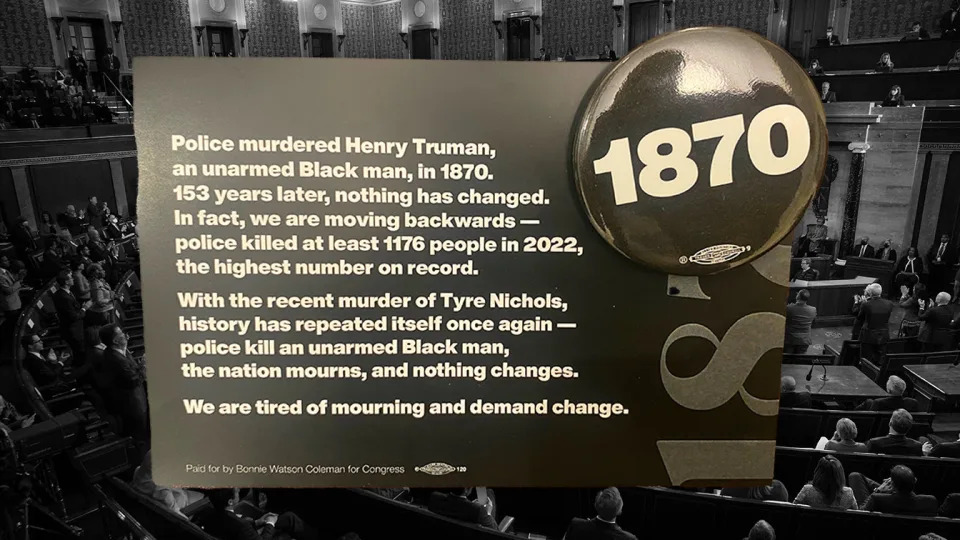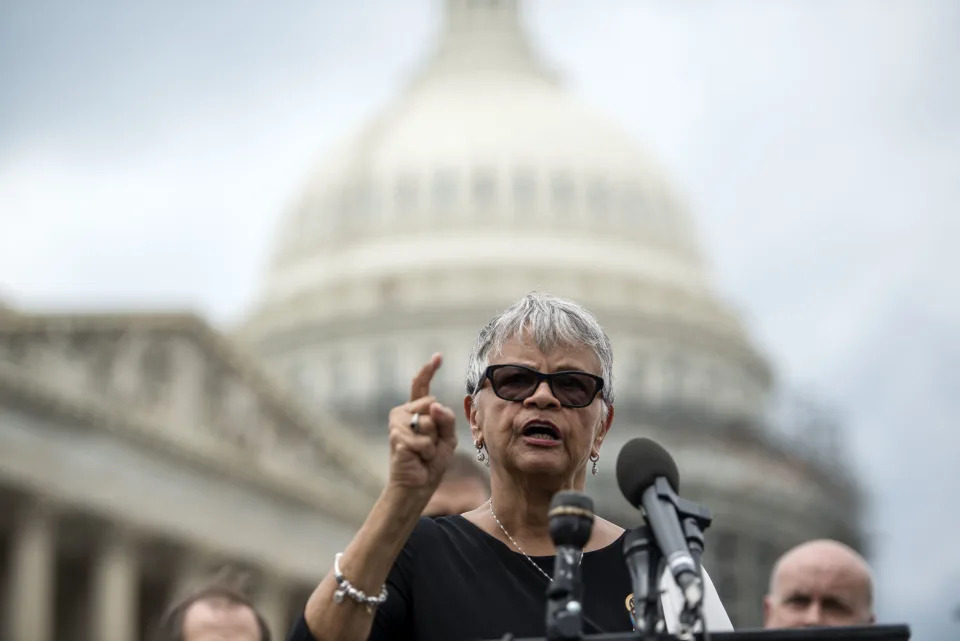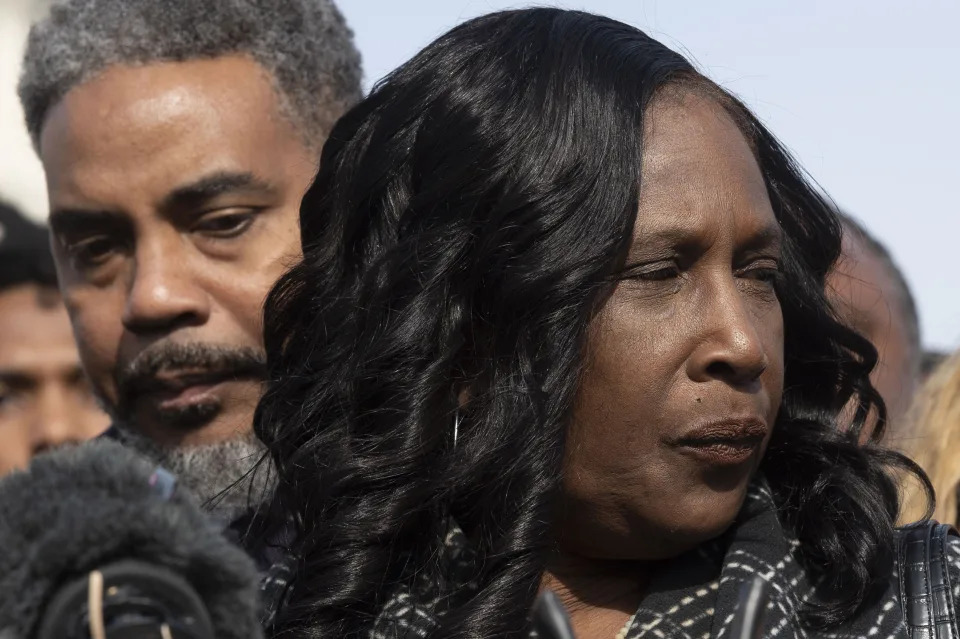Black '1870' pins worn by Congress members for State of the Union have deep significance
Members of the Congressional Black Caucus wore black pins with the number “1870” on them, which marks the year of the first known police killing of an unarmed and free Black person in the U.S.
Marquise Francis
·National Reporter
Tue, February 7, 2023

An "1870" pin to be worn by members of the Congressional Black Caucus and others at the State of the Union address. (Photo illustration: Yahoo News; photos courtesy of the office of Rep. Bonnie Watson Coleman, Jabin Botsford/Washington Post via Getty Images)
At President Biden's State of the Union speech Tuesday in which he addressed the country’s top issues before Congress, members of the Congressional Black Caucus and other Democrats made a bold statement of their own — albeit a silent one.
Many of them wore black pins with the number “1870” on them, which marks the year of the first known police killing of an unarmed and free Black person that occurred in the U.S. The pins are a call for action on reforming the institution of policing that has killed thousands of Black people in the 153 years since.
“I’m tired of moments of silence. I’m tired of periods of mourning,” New Jersey Rep. Bonnie Watson Coleman, a Democrat who came up with the idea to create the pins, told Yahoo News ahead of the speech. “I wanted to highlight that police killings of unarmed Black citizens have been in the news since 1870, and yet significant action has yet to be taken.”

Rep. Bonnie Watson Coleman at an event at the Capitol to demand that Congress renew an assault weapons ban, July 12, 2016. (Leigh Vogel/Getty Images for MoveOn.org)
On March 31, 1870, 26-year-old Henry Truman, a Black man, was shot and killed by Philadelphia Officer John Whiteside after being accused of shoplifting from a grocery store.
Whiteside had allegedly chased Truman into an alley when at some point Truman turned to ask what he had done wrong, and the officer fatally shot him, according to an account in the Philadelphia Inquirer the following day. At trial, Whiteside claimed he had been ambushed by a crowd while he chased Truman. Whiteside was later convicted of manslaughter. That same year the country adopted the 15th Amendment, which granted Black men the right to vote.
Over a century and a half since Truman’s killing, a steady stream of Black people have been killed by law enforcement, including 1,353 since 2017, according to data from Statista, a digital insights company. In fact, Black Americans are three times as likely to be killed by police as white people are, and they account for 1 in 4 police killings despite making up just 13% of the country’s population.
Many of the parents, siblings and children of Black people killed by police over the last decade were invited to Tuesday’s address as guests of members of the Congressional Black Caucus. The guest list included the families of Tamir Rice, the 12-year-old who was gunned down by Cleveland police in 2014 on a playground; Amir Locke, the 22-year-old fatally shot by Minneapolis police in a predawn, no-knock raid last year; Tyre Nichols, the 29-year-old fatally beaten by Memphis police during a traffic stop early last month; and a dozen other families who have lost loved ones.
“I hope today that we can get Congress to see that we need to pass this bill because this should never happen,” Nichols’s mother, RowVaughn Wells, said Tuesday afternoon at a press conference with the Congressional Black Caucus. “I don’t wish this on my worst enemy.”

RowVaughn Wells, mother of Tyre Nichols, who died after being beaten by Memphis police officers, speaks with reporters on Tuesday about police reform. (Cliff Owen/AP)
In contrast, several Republicans chose to honor members of law enforcement as their guests, including Rep. Mike Garcia of California, who brought Tania Owen, a retired detective and widow of a Los Angeles County sheriff’s sergeant who was shot and killed by a suspect when he answered a burglary-in-progress call in 2016. Rep. Elise Stefanik of New York and Rep. Lori Chavez-DeRemer of Oregon hosted police officers from their respective districts.
The invitations came after several other Republicans last week, during National Gun Violence Survivors Week, were photographed wearing AR-15 pins, which were passed out by Rep. Andrew Clyde of Georgia on the House floor. Clyde claimed the pins were “to remind people of the Second Amendment of the Constitution and how important it is in preserving our liberties.”
Many police reform advocates have argued that the systemic issues tied to policing transcend even racial lines, highlighting the fact that the five main officers involved in the brutal beating of Nichols were also Black.
“Blackness doesn’t shield you from all of the forces that make police violence possible,” James Forman Jr., a Yale law school professor and expert on race and law enforcement, told the New York Times. “What are the theories of policing and styles of policing, the training that police receive? All of those dynamics that propel violence and brutality are more powerful than the race of the officer.”
Karundi Williams, CEO of Re:power, an organization that trains Black people to become political leaders, told NBC News that addressing the core issues is the only way to prevent more killings.
“When we have moments of racial injustice that is thrust in the national spotlight, there is an uptick of outrage, and people take to the streets,” Williams said. “But then the media tends to move on to other things, and that consciousness decreases. But we never really got underneath the problem.”

Protesters in Oakland, Calif., on Jan. 29 to protest the police killing of Tyre Nichols in Memphis. (Tayfun Coskun/Anadolu Agency via Getty Images)
In 2022 alone, police killed 1,192 people, more than any year in the past decade, according to a new report released last week by the nonprofit Mapping Police Violence. Black people accounted for more than 300 of those killings. The report also claimed that many of these killings could have been avoided by changing law enforcement’s approach to such encounters, such as sending mental health providers to certain 911 calls.
But substantial police reform has continued to lag.
The 2021 George Floyd Justice in Policing Act, which was put forth following the murder of 46-year-old Floyd by Minneapolis police in 2020, seeks to end excessive force, qualified immunity and racial bias in policing and to combat police misconduct. The bill passed the House of Representatives twice in the previous Congress, but has continued to fail in the Senate.
"With the support of families of victims, civil rights groups, and law enforcement, I signed an executive order for all federal officers banning chokeholds, restricting no-knock warrants, and other key elements of the George Floyd Act," Biden said in his State of the Union speech. "Let’s commit ourselves to make the words of Tyre’s mother come true, something good must come from this."
Following the recent police killing of Nichols, members of the Black Caucus are cautiously optimistic that change will soon come.
“This unfortunately reignites the fervor and the necessity and the urgency,” Rep. Sheila Jackson Lee, D-Texas, a ranking member of the Judiciary Subcommittee for Crime, Terrorism, Homeland Security, and Investigations, recently told Yahoo News. “With 18,000 police communities, there has to be a federal law that addresses the training and the relationship between police. We have to restart.”

President Biden and Vice President Kamala Harris meet with members of the Congressional Black Caucus in the Oval Office last week. (Susan Walsh/AP)
An info card attached to the black pin given to members of the Black Caucus expresses the frustration of numerous police killings from Truman to Nichols.
“153 years later, nothing has changed,” the note reads in part. “We are tired of mourning and demand change.”
NOVA SCOTIA
Province approves green hydrogen project for Point Tupper
Tue, February 7, 2023

An aerial photograph shows black rectangles where EverWind Fuels plans to contruct portions of its industrial facility at Point Tupper, N.S. It will produce hydrogen and ammonia using methods that are considered more environmentally friendly than techniques which use natural gas. (Department of Environment - image credit)
Nova Scotia's Minister of Environment and Climate Change Tim Halman approved a proposed green hydrogen project in Point Tupper, N.S., on Tuesday
EverWind Fuels plans to use fresh water from a nearby lake to produce hydrogen in a process that's powered by renewable electricity from local wind-energy suppliers.
EverWind has said its hydrogen-making processes will create a much smaller carbon footprint than methods which use natural gas.
The system also creates nitrogen which the company plans to convert to ammonia and export for various industrial uses, including the production of agricultural fertilizer.
In a letter to the company released by the minister, Halman wrote:
"Following a review of the information provided by EverWind Fuels Company, and the information provided by the Mi'kmaq of Nova Scotia, and the public during consultation on the environmental assessment, I am satisfied that any adverse effects or significant environmental effects of the undertaking can be adequately mitigated through compliance with the attached terms and conditions."
The accompanying terms and conditions include 14 provisions that span the life of the project from design to decommissioning.
Among the conditions, the company:
Must "commence work" on the project within two years.
Must report yearly on "concordance" with the conditions of environmental approval.
Is forbidden from transferring or selling the project to anyone else without the minister's approval.
Must complete and file, with the province, management plans that detail operations, as well as measures to safeguard the environment, and deal with groundwater and wastewater.
Must monitor the air quality on the site.
Must create a reporting system which records all complaints received and details all corrective measures taken.
Must develop contingency plans for "worst-case scenarios" in case of an accident or malfunction.
Must submit an emergency evacuation plan to the province, local municipalities, Nova Scotia's Emergency Management Office, as well as local police and fire departments for review prior to the start of operations.

EverWind
In a company news release, EverWind called the decision "a significant milestone."
Company founder and CEO Trent Vichie said "EverWind is establishing a globally competitive clean energy hub" in the province.
"The Environmental Approval announced today, will enhance the region's ability to create the first mover supply chains necessary to scale quickly in new markets," said Vichie. "It creates the foundation of a new industry in Canada and Nova Scotia that will lead the green energy transition."
The company is hoping to begin operations by 2025.
B.C's pink sea urchins are on the move to shallower waters thanks to climate change
Tue, February 7, 2023

VANCOUVER — Pink sea urchins off the coast of Vancouver Island are expanding into shallower waters, in what researchers say is an indication of how rapidly climate change is affecting ocean life.
Researchers at Memorial University, Ocean Networks Canada and the University of Victoria found the urchins were moving into shallower water at an average rate of 3.5 metres per year as climate change and warming water reduce oxygen levels and food sources at lower depths.
The study's co-author Rylan Command says the movement of the pink urchins could, over time, lead to them replacing other species, like red sea urchin harvested in fisheries.
Researchers looked at 14 years of data including before, during and after the marine heat wave that persisted in the Pacific Ocean between 2013 to 2016 and became known as "The Blob."
Study co-author Fabio De Leo, who's with Oceans Network Canada, says warming from The Blob destroyed much of the kelp the urchins eat causing their populations to drop off dramatically.
The researchers say the warmer-than-normal surface temperatures also disrupted the ocean process known as "upwelling" when nutrient-rich water from lower depths cycles up to the surface, potentially affecting where the urchins find food.
This report by The Canadian Press was first published Feb. 7, 2023.
The Canadian Press
CANADASeasonal workers should get Medicare coverage, advocacy group says
Tue, February 7, 2023

The majority of New Brunswick's temporary foreign workers work in seafood processing, forestry and food manufacturing. (CBC - image credit)
An advocacy group is calling on New Brunswick to extend Medicare coverage to the thousands of temporary foreign workers living in the province.
Approximately 3,400 people work from six to eight months in the province's major industries — forestry, seafood processing and food manufacturing. Medicare is only available to those with a work permit that's valid for 12 months or more, which excludes seasonal workers.
Aditya Rao, founding board member of the Madhu Verma Migrant Justice Centre in New Brunswick, said seasonal workers are reliant on private health insurance purchased by their employer. This insurance rarely covers primary health care and lab tests, and there's no incentive for the employer to spend more than the minimum on the policies, he said.
"They're systemically excluded from access to Medicare," he said. "Their employers have to essentially play doctor and decide what level of private health-care insurance is appropriate for their workers."
Premier Blaine Higgs was in Ottawa Tuesday to meet with Prime Minister Justin Trudeau and discuss health-care transfer funds.
Rao is also calling on the federal government to attach strings to that health-care cash to make sure it all goes to health care, and that some of it goes to temporary workers.
Department of Health spokesperson Adam Bowie confirmed that only foreign workers with a work permit of 12 months or more are eligible for Medicare. He did not answer questions about why the province does not provide Medicare coverage to people with work permits valid for fewer than 12 months, or if the province has any plans to expand coverage in the future.
Rao said he's heard from a worker who had to pay $1,000 out of pocket for an ultrasound in New Brunswick. Another is currently fundraising to pay for dialysis, and another pays $30 for each doctor visit.
He said these workers don't feel comfortable speaking publicly because of fear of reprisal from employers, and therefore deportation. He said many people work for eight months, go back to their country, and hope their employer invites them back for the next season.
"If they speak out about issues that they're facing then they might not be called back," he said.
He said the expense is especially burdensome for temporary workers, who are already working low-paying jobs that are dangerous. Although workers come from all over the globe, the majority are from the Philippines and Mexico, Rao said.
International students were in the same situation, but that changed in 2017. Now, international students just have to show a valid study permit and proof of full-time registration at a New Brunswick college or university to get Medicare coverage. New Brunswick became the eighth province to cover international students.
Extended coverage in other provinces
Foreign workers are required to have work permits for 12 months or longer in order to qualify for health care in New Brunswick, Alberta, Newfoundland and Labrador and Manitoba.
Nova Scotia, Prince Edward Island and British Columbia require a six-month work permit.
In Saskatchewan, temporary foreign workers must live in the province for three months before they're eligible, just like all other new residents.
Quebec has extended coverage specifically for temporary foreign workers. Agriculture workers, and temporary foreign workers from Guatemala, Honduras, Mexico or Salvador can have provincial health-care coverage immediately upon arrival to Quebec.
COVID-19 measures in Ontario have resulted in making all temporary foreign workers eligible for provincial health care, said Rao, but there's no indication how long that will last.
Dog owners tout Xolos' loyalty and sacred underworld history
Tue, February 7, 2023

MEXICO CITY (AP) — Mezcal is not your ordinary pet. Hundreds of years ago the Latin American Indigenous group, the Nahuas, believed that a hairless dog like him, a Xoloitzcuintle, was a sacred creature who could guide its deceased master through the underworld.
Dozens gathered on a recent day at Antiguo Colegio de San Ildefonso in Mexico City for a meet-and-greet with Mezcal and three more “Xolos”, as these slender dogs are locally known. The canines were at the art and culture museum as part of an effort to raise awareness about responsible adoption of Xolo puppies and promoting the significance of the breed.
“Can I touch him?” asked a woman working security for the museum, as she nervously brought her hand closer to the dog’s head
“Absolutely! He loves to be petted,” said Mezcal’s owner, Nemiliz Gutiérrez, who leads a project with her sister, promoting the breed to the public.
By reviewing ancient codex and records written after the conquest in 1521, experts have determined the religious relevance of the dogs among Mesoamerican civilizations. That fact isn’t lost on the sisters.
“We are privileged because we have among us some precious jewels of history that are living cultural heritage,” said Gutierrez’s sister, Itzayani, who owns a playful Xolo named Pilón.
Experts found that the Nahuas believed these dogs represented the god, Xólotl, the twin brother of deity Quetzalcóatl. While the latter personified life and light, the former was an effigy of the underworld and death. The Xolo, thought to be a creature capable of moving through the darkness, was conceived as a guide for their owner’s soul after dying, wrote historian Mercedes de la Garza in an article published by the National Autonomous University of Mexico.
Burial sites found by archaeologists in central Mexico show the remains of men and dogs lying side by side, which suggests that Xolos may have been sacrificed during their masters’ funeral rites. It was thought to be a way the living could ensure that when the soul of their loved ones reached the river of the underworld, it could reunite with its dog, mount on his back and cross together.
In the Nahuatl language, “Xolo” means “monster”, and though some dislike the physical appearance of these dogs, many find them fascinating. Mezcal’s hairless skin is dark as a shadow. When touched, it feels soft and warm. His teeth are rarely visible, as Xolos don’t bark much. On the recent day, he posed for pictures like a movie star and leaned his head toward visitors wanting to pet him.
Like his predecessors, Mezcal never loses sight of Gutiérrez, who constantly pats her loving dog.
“Xolos are loyal by nature,” said Gutiérrez. “If one is adopted by a family, it will choose a member to stick with.”
The closeness between Xoloitzcuintles and their owners was also noted by the Nahuas, according to experts. To please the gods, some Xolos were sacrificed in order to spare their masters’ lives.
The dogs were killed in those ceremonies by extracting their hearts. This fact distinguished them from any other animal offered in sacrifice, wrote De la Garza.
The dogs also are a part of modern-day culture in Mexico and beyond. At least a couple of Xoloitzcuintles can be seen in Frida Kahlo’s paintings. A few more appear in portraits where the artist posed with her husband, Mexican muralist Diego Rivera. Their love for these pets was shared by friend and art collector Dolores Olmedo, whose home in Mexico City became a museum and until recently took care of a few Xolos that visitors could approach.
In 2016, the capital’s mayor gave the Xoloitzcuintle a cultural heritage designation, and a year later, a charming Xolo named Dante reached world fame after his appearance in animated film “Coco”, which portrayed the adventures of a Mexican boy through the underworld.
Back in San Ildefonso, the Gutiérrez sisters hope more people will come to appreciate the breed’s significance and help it thrive. Once thought by experts to be headed toward extinction, Xolos can be spotted in upper class Mexico City neighborhoods. Nemiliz Gutiérrez adopted Mezcal, but said some breeders sell the dogs for upwards of $3,500.
Not every Xolo is in demand though, especially the variety with fur.
“Almost nobody wants them,” said Gutiérrez, who works with her sister to find caring homes for all Xolos regardless of their coats. Through that process, they enjoy sharing about the breed’s historic significance – when Xolos embodied an endless love believed to transcend death.
___
Associated Press religion coverage receives support through the AP’s collaboration with The Conversation US, with funding from Lilly Endowment Inc. The AP is solely responsible for this content.
María Teresa Hernández, The Associated Press
UK
Stronger protections needed for responsible renters who own pets, say charities
Vicky Shaw, PA Personal Finance Correspondent
Tue, 7 February 2023

Better protections are needed for responsible renters who own pets, according to animal welfare charities.
Dogs Trust said it has been receiving a record number of inquiries from people forced to rehome their pets, as they struggle with rising living costs.
Around one in 10 of those owners contacting the charity cite issues with housing as the reason for needing to rehome their dog.
Dogs Trust said this group includes some people being forced to move or downsize as rental prices increase, but who are unable to find suitable, affordable pet-friendly properties.
Meanwhile, Cats Protection said that last year it took in around 1,300 cats – the equivalent of around three each day – due to landlords not allowing them in their properties.
The Government has outlined plans to introduce stronger protection for tenants as part of its Renters’ Reform Bill.
A Department for Levelling Up, Housing and Communities spokesman said: “We know how much people love their pets, which is why we are making it easier for renters to have them in their home.
“We will bring forward legislation (which will apply in England) to, for the first time, give all tenants the legal right to request a pet in their house which landlords must consider and cannot unreasonably refuse.
“This is all part of our wider measures to transform the rental market and provide a new deal for tenants.”
Paula Boyden, veterinary director of Dogs Trust, said: “2022 was the busiest year in our history for relinquishment inquiries.
“Sadly, one of the most common reasons we see dogs handed in to our rehoming centres is due to a change in the owner’s living circumstances and a lack of available pet-friendly accommodation.
“For most dog owners, being separated from their dog is no different from being separated from a family member, so the introduction of new protection for renters will help ensure that fewer owners are forced to make the heart-breaking decision to give up their beloved pets.
“We are pleased to see that the Government has plans to include pet-friendly policies in its Renters’ Reform Bill, and hope to see these rights enshrined into law soon so that the benefits of pet ownership are no longer exclusive to homeowners, but open to renters as well.”
Madison Rogers, head of advocacy and government relations for Cats Protection, said: “Pet ownership should not be a privilege in modern society and Cats Protection is urging the Government to move forward with planned legislation to end blanket ‘no pets’ policies and give renters with pets better protections.
“In the meantime, there are a few things renters looking for a pet-friendly property can do: start looking for pet-friendly housing early, proactively ask letting agents or landlords if they allow pets even if it says ‘no pets’ on the advert, and create a ‘pet CV’ outlining the measures you will take to be a responsible pet owner, such as providing veterinary records and details of your pet’s behaviours.”
Dogs Trust said it has been providing advice and resources to pet owners, landlords and letting agencies through its Lets With Pets scheme.
Cats Protection also operates its Purrfect Landlords programme, which provides advice to tenants, landlords and social housing providers on how to conduct discussions aimed at keeping cats in rented properties, with further information available at cats.org.uk/purrfectlandlords.
Chris Norris, policy director for the National Residential Landlords Association (NRLA), said: “We recognise the importance of pets for many tenants and, specifically, the strong sense of companionship they provide to their owners.
“Our biggest concern has always been that the law, as it currently stands, prevents landlords from making it a requirement that tenants take out insurance to cover the risk that their pets will cause damage to the rental property. Given this, we welcome the Government’s plans, which will enable landlords to ask pet owners to have the required insurance to cover such damage.
“As ministers continue to work on the Renters’ Reform Bill, it is vital that the law takes a common-sense approach to pets in private rented accommodation.
“It needs to reflect the fact that some properties, such as flats without gardens, may not be suitable for certain types of pets. Likewise, in shared homes, the rights of those wanting a pet need to be balanced with the rights of fellow tenants who might have concerns, especially those with certain allergies.”
McDonald’s pledges to protect UK staff from sexual harassment after complaints
Anna Wise, PA Business Reporter
Tue, 7 February 2023

McDonald’s has signed a legal agreement with the equality watchdog amid concerns over how it has handled sexual harassment complaints made by UK staff.
The move comes after allegations by workers at the fast-food chain’s US restaurants of sexual harassment in the workplace over several years and the company’s failure to deal with the issue.
It is not known how many current complaints have been made in the UK but the Bakers, Food and Allied Workers Union (BFAWU) claimed in 2019 that more than 1,000 UK cases have been reported.
The legally binding agreement, with the Equality and Human Rights Commission (EHRC), commits the group to a number of measures to better protect workers in the UK.
It does not include chains in Ireland or overseas, such as in the US.
Such measures include communicating a “zero tolerance” approach to sexual harassment, to provide anti-harassment training for its employees, and to improve policies to better respond to complaints.
Alistair Macrow, chief executive of McDonald’s in UK and Ireland, said the company already has a “strong track record” in this area but wants to further improve it.
“As one of the UK’s leading employers, the safety and wellbeing of our people is our absolute priority,” he said.
“It is hugely important to me that everyone in our organisation feels safe, respected and included at all times – this is core to the values of our business.
“We already have a strong track record in this area and I now welcome the opportunity to work with the EHRC to further strengthen this.”
Mr Macrow stressed that harassment and abuse “have no place in our society or at McDonald’s”.
In 2021, McDonald’s said it would require workers around the world to undergo anti-harassment training after it emerged that at least 50 employees globally had filed charges against the chain over the previous five years.
The charges alleged physical and verbal harassment and, in some cases, retaliation when they complained.
Workers in several US cities staged a strike in 2018 to protest against the fast-food giant’s alleged failure to prevent sexual harassment at work.
Meanwhile, in the UK, the BFAWU has previously raised the alarm over a “toxic culture” in restaurants and stated that at least 1,000 women have been harassed by managers and supervisors.
Ian Hodson, national president of the BFAWU, said: “It’s shameful that one of the richest corporations on the planet doesn’t take sexual harassment seriously until we raise it.
“I pay tribute to all our members who have spoken out on this issue and encourage McDonald’s to work with us in ending sexual harassment.”
The EHRC says it is responsible for enforcing the Equality Act 2010, which makes employers legally responsible if an employee is sexually harassed at work by a colleague, and the employer has not taken all steps they could to prevent it from happening.
The group has been behind similar agreements with the likes of Sainsbury’s, which it started working with in 2019 after a member of staff won an employment tribunal claim for sexual harassment.
The supermarket chose to work with the regulator as an alternative to being investigated, the EHRC said.
EHRC chairwoman Baroness Kishwer Falkner said: “There should be zero tolerance of sexual harassment in every organisation. It can devastate people’s lives and create a toxic working environment for all.
“We are determined to crack down on workplace cultures of sexual harassment, whether in restaurants or hotels, sports clubs or offices.
“We are pleased that McDonald’s has signed this agreement to signal their intent to make their restaurants safe places to work.
“The improvements they put in place can set an example for others to follow, whether in the hospitality industry or elsewhere.”
UK
Fire Brigades Union warns of strikes without pay talks progress
Alan Jones, PA Industrial Correspondent
Tue, 7 February 2023

Strikes by firefighters will be announced unless there is no progress in last-minute talks over pay on Wednesday, a union has warned.
The Fire Brigades Union (FBU) called for a “significant shift” from employers following a huge vote for industrial action over a 5% pay offer.
The union said it hopes to resolve the dispute without a strike, and is giving employers chance to come forward with an improved offer.
If the talks fail, strike dates are expected to be announced on Thursday.
FBU general secretary Matt Wrack, said: “The strength of feeling among firefighters is clear, with an 88% vote in favour of strikes by FBU members, and 94% in Northern Ireland.
“That’s one of the biggest mandates for industrial action by a trade union in recent years.
“The reason for that massive vote to strike is simple: firefighters are dealing with financial hardship and the growing threat of ‘in work’ poverty, with a real-terms cut to their wages.
“They are struggling to pay the bills during the cost-of-living crisis that this Government is presiding over.
“Going on strike is an absolute last resort for firefighters.
“However, this action can still be avoided if the employers make an offer which addresses the concerns of firefighters.
“The FBU is adopting an open-minded and constructive approach to the talks today, having already delayed strike action by 10 days to allow employers to meet us.
“Industrial action is not inevitable if the employers genuinely engage with the FBU about the anger among firefighters about poverty pay and improve their offer to address our concerns.
“However, firefighters will not be messed about, and the Government and employers cannot ride roughshod over the 88% vote for strikes by FBU members.
“If there is no significant shift from the employers, then strikes will be announced tomorrow (Thursday).
“The responsibility for any disruption to services would then firmly lie with fire service employers and government ministers for not delivering a serious pay offer.”
Unilever to build Mexico plant as part of $400 million investment
Tue, 7 February 2023

MEXICO CITY (Reuters) - Unilever Plc will build a manufacturing plant in the northern Mexican border state Nuevo Leon as part of a $400 million investment in the country over the next three years, the company said on Tuesday.
The plant, which will be located in Salinas Victoria on the outskirts of Monterrey, will manufacture beauty and personal care products, Unilever said.
The investment will bring in 1,200 new direct and indirect jobs, the company added.
Unilever already operates four plants in the country, which is a key center for exports to other nations, the company said. The newest plant is set to open in 2024, Unilever said.
In recent months, major producers from Mattel Inc to BMW have opted to invest in Mexico as part of a boom in "nearshoring," or bringing supply chains closer to their final destination.
(Reporting by Kylie Madry in Mexico City; Editing by Matthew Lewis)
UK
Fewer than one in 200 companies have credible climate plans, says CDP
Tue, 7 February 2023

An exhaust emits fumes as a car is driven through Richmond in London
LONDON (Reuters) - Fewer than one in 200 companies who submit climate change-related data to a leading environmental disclosure platform have credible climate transition plans, the nonprofit platform CDP said on Wednesday in its latest review of corporate submissions.
The data underlines the scale of the gap between company pledges to transition to net-zero carbon emissions, and the detailed plans that show how a firm will align its entire business model to meeting those targets.
Of 18,600 companies which provided CDP with data only 81 - or 0.4% - disclosed information against 21 key indicators that CDP includes in a questionnaire and which it says represents a credible plan.
The 81 companies was a lower number than the 135 which disclosed against key indicators last year, which CDP said was down to the platform "raising the bar, in accordance with latest science, on what constitutes a credible climate transition plan".
CDP's key indicators include everything from whether the company board has oversight of a climate plan to financial planning.
"The need for companies to develop a credible climate transition plan is not an additional element but an essential part of any future planning," Amir Sokolowski, global director, climate, at CDP said in a statement.
"Companies must evidence they are forward planning in order for us to avert the worst impacts of climate change and to send the correct signals to capital markets, that they will remain profitable."
Companies headquartered in Japan ranked highest with 16 firms disclosing against the 21 indicators. Six out of 1,448 UK-based companies provided full disclosure, CDP found.
CDP has emerged as the world's biggest repository of environmental data submitted on a voluntary basis by companies, which are under pressure from their shareholders to disclose how they plan to navigate the transition to a lower-carbon future.
The platform worked on its analysis with the UK Transition Plan Taskforce, which is developing mandatory standards for listed companies and financial firms to ensure plans are comparable.
(Reporting by Tommy Reggiori Wilkes; editing by Jonathan Oatis)










